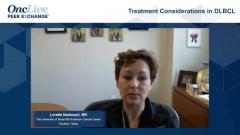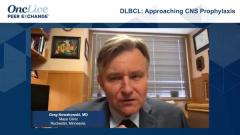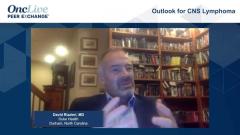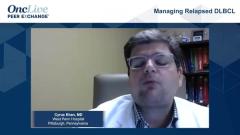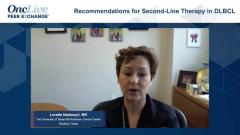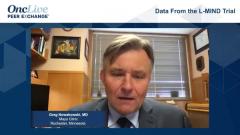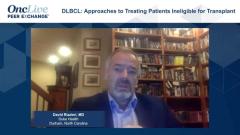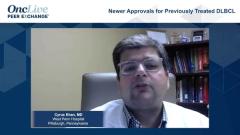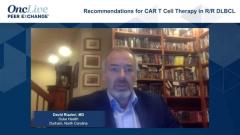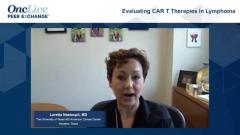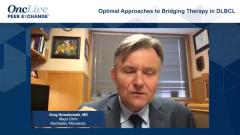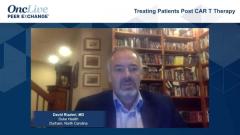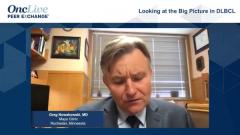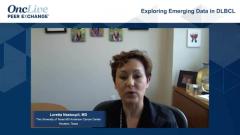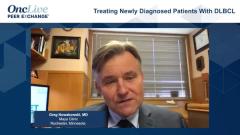
Outlook for CNS Lymphoma
David Rizzieri, MD, discusses new data from the ASCO 2021 Virtual Meeting regarding CNS lymphoma and treatment approaches in this setting.
Episodes in this series

John Leonard, MD: I want to move to an even more rare subtype of large cell lymphoma, but we did have some data at ASCO [American Society of Clinical Oncology Annual Meeting], and we wanted to touch on this. David, for the approach to primary CNS [central nervous system] lymphoma, there were a couple studies. Obviously, everyone knows we approach methotrexate-based therapy for most patients with primary CNS lymphoma without systemic disease. There are several regimens, perhaps controversies about radiation, and new data on auto transplant in the consolidation. What’s your take on this entity and the new data?
David Rizzieri, MD: I was particularly pleased to see this on our list of topics, not because I have a lot to contribute, but because I want to hear what you guys do. I find this group of patients difficult to treat and manage. It’s a tough disease. We talk about high-dose methotrexate, but high dose means something different at different centers. As a transplanter, my preference is first remission auto-transplant, but we don’t see the majority of these patients. So it’s good to see the evolution of the data.
As you were intimating, John, we know the matrix data from many studies. But 1 of the primary studies that we point to was in Lancet Hematology in 2016, highlighting the value of high-dose methotrexate and the 3.5 g/m2 dosing with your Hi-DAC [high-dose ara cytarabine] and Rituxan and thiotepa, with or without radiation or transplant. There’s a clear benefit, at least in my reading of the literature of auto transplant in first remission for such patients. But that’s in contrast to much of the more recent trend that we see and some of the papers we saw at ASCO this year, which really speak to high-dose methotrexate being 8 g/m2. That’s the other form we’ve been using for some years.
Abstract 2062 had a nice review for us to start putting perspective around this issue. Their group looked at the National Cancer Institute database to examine the effect of whole-brain radiation or auto-transplant as consolidation in patients after they’ve been already induced to a remission. In the National Cancer database there are over 16,500 patients treated from 2004 to 2016. Very appropriately, they did a progression analysis but added in a propensity score waiting to account for group differences in those who may end up getting radiation vs transplant. And the propensity analysis is something that’s really important to help account for differences in our choices of who we’re going to recommend get transplant vs radiation. It’s becoming more common in our reviews to do that type of weighted score. They did include that in this abstract.
It was interesting to me that they saw differences in older patients and older patients living in rural areas, higher education, and a longer distance from the treatment center all had a higher propensity for auto transplant. That was a little different from what I would have expected, but it may speak more about the logistics of having to stay someplace for radiation for a few weeks as opposed to autotransplant, where that’s often included in a case rate. Lodging benefit is there, and it’s somewhat easier for patients and caregivers. I thought that was interesting.
In their review they showed a clear benefit for 3-year survival of autotransplanting in consolidation. I’d like to put a plea out there for my colleagues treating patients with CNS lymphoma: Don’t forget autotransplant in first remission. The data are growing, and they continue to be supported. Similarly, there’s another report that you’re aware of from ASCO this year. That group continues to lead us in gaining knowledge for treating patients they’ve been involved with, leading our fight in treating CNS lymphoma for quite some time. They reported the CxALGB-51101, or Alliance, as you’re well-aware. That built on the prior work of CALGB-50202, which looked at a different dosing of high-dose methotrexate, right? This was 8 kg/m2 every other week with rituximab and temozolomide. We’re aware from the CALGB-50202 study that the remission rate and durability are really encouraging with a high-dose methotrexate.
CALGB-51101 took that next step and said if high-dose methotrexate is good, do we still need transplant? Or can we induce patients, provide a cycle of high-dose cytarabine and etoposide, and call it a day? That comparative study is very encouraging. We continue to see a benefit for important end points for autotransplant in first remission. Progression-free survival has improved. Three-year overall survival, if I remember right, was 83% vs 72%. The emerging data—I’ll be interested in your take on it—suggest we should be focused on 8 kg/m2 methotrexate as part of our production regimen for all patients who can tolerate it and autotransplant, and first remission should still be considered a reasonable standard. I’m interested if you guys have the same take.
John Leonard, MD: I agree. The other thing that comes out of this is that we need better induction therapies to get more patients into remission. We in the Alliance [for Clinical Trials in Oncology] have a study in which we’re adding lenalidomide and also adding an immune checkpoint inhibitor as part of an induction regimen to try to get more people into remission. Because there’s still a substantial fraction, more than a third of patients won’t go into a CR [complete remission], and that’s probably where there can be the biggest bang. If we can get beyond the methotrexate, as we talked about with our chart, we’ve probably gotten as far as we’ve gotten with chemotherapy. We need to have other approaches. Great summary. Thank you, David.
David Rizzieri, MD: I’m sure all of us have seen it, but adding radiation to high-dose chemotherapy can have really toxic effects and some devastating results—loss of function, cognitive deficits—that you don’t see with autologous transplants. I hope that the trend goes toward that.
TRANSCRIPT EDITED FOR CLARITY


